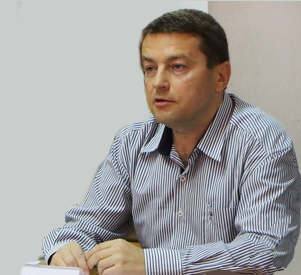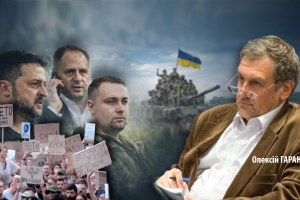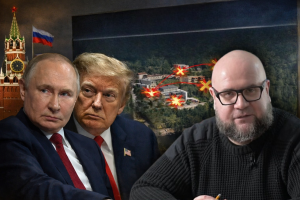 Oleksandr Reznik, PhD, deputy of the Social and Political Processes department at the Institute of Sociology of the National Academy of Sciences of Ukraine, head of the Center for Political Sociology
Oleksandr Reznik, PhD, deputy of the Social and Political Processes department at the Institute of Sociology of the National Academy of Sciences of Ukraine, head of the Center for Political Sociology
The negative attitude towards vaccination and the lack of commitment towards vaccination are the chief obstacles to combating that COVID-19 pandemic in the long term. Among the reasons they do not want to get vaccinated, Ukrainians referred to the skepticism towards specific vaccines and their efficiency as well as the resistance to government intervention. In the public domain, one can observe the anti-vaxxer phenomenon – people coming together that deny the efficacy, safety, and the legal ramifications of vaccination. That is why it is important to identify the chief factors that motivate these beliefs and concerns.
Long before to the COVID-19 pandemic, scientists proposed a theory of information transmission based on one’s culture that stipulates that deeply rooted cultural characters influence one’s attitude towards vaccination [Kahan et al., 2010]. In other words, individuals tend to align their perception of the risk of vaccination with their cultural attitudes towards possibly dangerous activities. In particular, individuals tend to agree with the information about vaccination that corresponds to their values; they trust experts with the cultural background similar to their own; they actively respond to the potential risks of vaccination based on emotions that are motivated by cultural factors. The reason why the various populations perceive the risks of vaccination differently has to do was sociocultural characteristics, such as one’s ethnic background, the preferred language of communication, race, religious affiliation, etc. These are the very sociocultural identities that influence one’s choice and attitude towards the different sources of information and their content.
Studies have shown that cultural perspectives account for the differences in one’s perception of vaccination along with characteristics, such as socioeconomic status, education, as well as political ideology and can interact with these factors or multiply their influence. In particular, the recent studies by the British scientists identified that the mistrust towards vaccines is more prevalent among the representatives of ethnic minorities, those with lower education achievement, lower income, poor knowledge about the COVID-19 pandemic, and poor discipline with regards to the government recommendations concerning the pandemic [Paul, Steptoe, Fancourt, 2021; Stead et al., 2021].
Ukraine now has one of the lowest levels of vaccination worldwide. The governmental policy during the early stages of the vaccination campaign is one obvious issue, but the lack of willingness to vaccinate and the fear of the vaccines by the population even when several vaccines are available remains a major obstacle. It took governmental regulations and requirements to get vaccinated for state employees to incentivize many citizens to get vaccinated. In other words, Ukrainians might not be motivated to get vaccinated, but they are not ready to lose their job or other benefits, such as the use of public transportation and access to restaurants/cafes, gym, etc.
Therefore, the goal of the study is to identify the factors that contribute to vaccine hesitance and resistance. More specifically, the study aimed to: 1) empirically identify the proportion of those who got vaccinated or plans to do so and those who do not plan to get vaccinated; 2) the analysis of social, demographic, and cultural characteristics of the groups of respondents with regards to their intention to get vaccinated.
The empirical analysis was performed by means of a nationwide survey conducted by the Democratic Initiatives Foundation named after Ilko Kucheriv jointly with the Center for Political Sociology from August 14 to August 24, 2021. 2001 respondents aged over 18 y.o. were interviewed in all regions of Ukraine, except for Crimea and the occupied territories of the Donetsk and Luhansk oblasts, a sample representative of the adult population according to the key socio-demographic indicators. The theoretical sampling error does not exceed 2.2%. The survey was conducted when mandatory vaccination for state employees, such as the legislation that took effect in October 2021, was not implemented. This circumstance is especially relevant because it allowed our team to analyze the attitudes of citizens in a “pure” state not affected by vaccination requirements.
The survey results confirmed the official statistics with regards to the proportion of the vaccinated population (18.4%) at the time the survey was conducted (table 1). A quarter of respondents planned to get vaccinated shortly. Still, more than half of adults in Ukraine did not plan to get vaccinated. Of course, the respondents from the latter group should not all be treated as “anti-vaxxers”, but the arguments used by this group are in line with the anti-vax agenda: “I believe that the vaccines require more testing” – 52.6%; “I am concerned about the consequences/side effects of the vaccines” – 44.4%; “I do not believe that vaccination will protect me from COVID-19” – 31.7%; “I am concerned about the governmental requirement to get vaccinated” – 30.5%.
Table 1
Responses to the survey of the adult Ukrainians: “The vaccination campaign is taking place in Ukraine. Are you vaccinated?”, August 2021.
Responses | % |
Yes | 18.4 |
No, but I plan to get vaccinated shortly | 25.1 |
No, and I do not plan to get vaccinated shortly | 56.5 |
The respondents were divided into groups based on their intention to get vaccinated, age, education, family income, type of settlement and region.[1] Responses that represent certain combinations of these factors were omitted due to the lack of relevant responses (fewer than 100 respondents per category). More specifically, the responses that represent the combinations involving “unfinished secondary education” and “our income covers almost all of our needs” were omitted.
The analysis revealed that not all factors impact the attitude of the adult Ukrainians to vaccination (table 2).
Table 2
Commitment to vaccination across the various social and demographic groups, % (August 2021)
Social and demographic groups | Are you vaccinated? | ||
Yes | No, but I plan to get vaccinated shortly | No, and I do not plan to get vaccinated shortly | |
Age |
|
|
|
18-29 y.o. | 18.7 | 23.9 | 57.4 |
30-39 y.o. | 19.7 | 26.4 | 53.9 |
40-49 y.o. | 19.9 | 27.2 | 52.8 |
50-59 y.o. | 17.5 | 23.0 | 59.5 |
60-69 y.o. | 17.7 | 25.5 | 56.8 |
70+ y.o. | 14.3 | 24.8 | 60.9 |
Education |
|
|
|
Secondary | 14.5 | 25.1 | 60.4 |
Specialized secondary education | 15.1 | 24.4 | 60.5 |
Higher (including unfinished) education | 24.6 | 26.5 | 49.0 |
Family income |
|
|
|
Our family barely makes ends meet, and we do not have enough money to afford the most basic goods | 10.8 | 20.2 | 69.0 |
Out family has enough to buy food and inexpensive goods | 15.5 | 25.0 | 59.5 |
Overall, our family has enough, but the purchase of relatively expensive goods, such as furniture, TV, or fridge is an issue | 21.4 | 27.2 | 51.4 |
Our family is relatively well off, but currently we cannot afford certain goods, such as a car, an apartment, etc. | 24.6 | 25.7 | 49.7 |
Settlement type |
|
|
|
Kyiv | 24.7 | 24.7 | 50.7 |
Oblast/regional center | 19.2 | 26.5 | 54.3 |
District center or a town | 15.4 | 24.7 | 59.9 |
Small town/village | 19.1 | 24.6 | 56.4 |
Region |
|
|
|
West | 22.1 | 30.8 | 47.1 |
Center | 18.7 | 22.7 | 58.6 |
East | 18.2 | 22.8 | 59.1 |
South | 16.5 | 28.4 | 55.2 |
Donbass | 8.6 | 16.4 | 75.0 |
Age is a factor that does not significantly influence one’s attitude towards vaccination. One notable observation: among those aged 30-39 y.o. and 40-49 y.o. there is a slightly lower proportion of those against vaccination as compared to the elderly.
It was expected that among those with higher (including unfinished) education there are fewer individuals who do not plan to get vaccinated, but even this educated group is split in half. One’s income is an important factor: the more well-off people are, the higher the likelihood that they are vaccinated and the lower the likelihood that they plan to get vaccinated. Perhaps the recent initiative by the Ukrainian government to pay 1000 hryvnias (circa $40) to every vaccinated citizen will become a source of motivation to get vaccinated for the poorest citizens.
The proportion of those who got vaccinated or were planning to do so shortly did not vary by settlement type, although the survey did show that the residents of the capital are slightly more likely to get vaccinated. Region, however, was an important factor, which showed that the West of the country is the region that has the highest proportion of the vaccinated or those planning to do so. In the Center, South, and East of the country the distribution of those committed and opposed to vaccination is roughly similar. The Donbass region has the highest proportion (75%) of those not willing to get vaccinated.
To survey also looked at one’s language identity, language preference, religious affiliation, as well as one’s beliefs about Ukraine’s geopolitical and security affiliations. In particular, language identity and preference are the most important factors (table 3). Among those who identify Russian as their native language there were fewer of those willing to get vaccinated that there were among those who identify Ukrainian as their native language. Similarly, respondents who communicate in Russian on a daily basis are more likely to oppose vaccination than those respondents that communicate in Ukrainian.
Table 3
Commitment to vaccination by language identity and use, % (August 2021)
Language characteristics | Are you vaccinated? | ||
Yes | No, but I plan to get vaccinated shortly | No, and I do not plan to get vaccinated shortly | |
Language identity (native language) |
|
|
|
Ukrainian | 20.2 | 25.9 | 53.9 |
Russian | 12.1 | 22.8 | 65.1 |
Language of communication |
|
|
|
Ukrainian | 20.8 | 26.4 | 52.8 |
Russian | 14.1 | 22.8 | 63.1 |
The analysis of the respondents’ commitment to vaccination based on religious affiliation was only possible for the religious affiliations that were selected by at least 100 respondents. Among those who identify themselves with the Orthodox Church of Ukraine and Ukrainian Greek Catholic Church, there were fewer respondents that lack commitment to vaccination, as compared to the same proportion among those who identify themselves with the Ukrainian Orthodox Church, MP. Those whose religion affiliation lies outside of the mainstream orthodox churches were more likely to oppose vaccination. Surprisingly, atheists were most likely to lack the commitment to vaccination.
Table 4
Commitment to vaccination by religious affiliation, % (August 2021)
What is your religious affiliation? | Are you vaccinated? | ||
Yes | No, but I plan to get vaccinated shortly | No, and I do not plan to get vaccinated shortly | |
Ukrainian Orthodox Church, MP (Onufrii) | 16.0 | 26.3 | 57.7 |
Orthodox Church of Ukraine (Epifanii) | 24.4 | 26.6 | 49.0 |
Ukrainian Greek Catholic Church (Sviatoslav) | 19.8 | 32.6 | 47.7 |
Other orthodox church or orthodox religious affiliation | 18.6 | 17.3 | 64.2 |
No religious affiliation/atheist | 14.5 | 21.2 | 64.3 |
Commitment to vaccination varies depending on the respondents’ beliefs about Ukraine’s geopolitical affiliations and security (table 5). The highest support for vaccination is found among those who support a pro-European agenda, and the highest opposition to vaccination among those who believe that Ukraine should join the Eurasian Economic Union that includes Russia, Belarus, and Kazakhstan. Notably, the undecided and those who do not want Ukraine to participate in the international political bodies largely oppose the vaccination (about two thirds of the respondents).
Table 5
Commitment to vaccination by the respondents’ beliefs about Ukraine’s geopolitical affiliation, % (August 2021)
What international political body should Ukraine seek to join? | Are you vaccinated? | ||
Yes | No, but I plan to get vaccinated shortly | No, and I do not plan to get vaccinated shortly | |
European Union | 23.3 | 30.0 | 46.7 |
Eurasian Economic Union that includes Russia, Belarus, and Kazakhstan | 10.0 | 19.9 | 70.1 |
Ukraine should not participate in the international political bodies | 16.3 | 20.2 | 63.6 |
Undecided | 12.0 | 21.5 | 66.5 |
Those who believe that Ukraine should join NATO are more likely to commit to vaccination than those who would prefer Ukraine joining the military Union of Russia and the CIS states (table 6). The case of the respondents’ beliefs about the security affiliation of Ukrainians is similar to that of the respondents’ beliefs about Ukraine’s geopolitical affiliation in more than one regard: two thirds of the undecided and those who believe that Ukraine should not participate in the international security bodies do not commit to vaccination.
Table 6
Commitment to vaccination by the respondents’ beliefs about Ukraine’s geopolitical affiliation, % (August 2021)
What international security body should Ukraine seek to join? | Are you vaccinated? | ||
Yes | No, but I plan to get vaccinated shortly | No, and I do not plan to get vaccinated shortly | |
NATO | 22.9 | 29.0 | 48.1 |
Military Union of Russia and the CIS states | 8.0 | 18.2 | 73.9 |
Ukraine should not participate in the international security bodies | 14.6 | 23.1 | 62.2 |
Undecided | 17.1 | 21.2 | 61.6 |
Electoral preferences are another factor that predicts one’s commitment to vaccination (table 7). Only the data from the respondents that selected one of the four most popular political parties (more than 100 responses) can be analyzed.
Table 7
Commitment to vaccination by political affilition, % (August 2021)
If the elections to the Verhovna Rada, Ukraine’s parliament, were held next week, what party would you vote for? | Are you vaccinated? | ||
Yes | No, but I plan to get vaccinated shortly | No, and I do not plan to get vaccinated shortly | |
Batkivshchyna | 25.7 | 25.1 | 49.1 |
European Solidarity | 27.4 | 33.5 | 39.1 |
Opposition Platform – for Life | 10.6 | 25.4 | 64.0 |
Servant of the People | 23.5 | 31.2 | 45.4 |
Undecided | 19.1 | 23.3 | 57.6 |
I do not participate in elections | 10.0 | 16.4 | 73.6 |
The electorate of the European Solidarity party is most likely to commit to vaccination. Those who support the Opposition Platform – for Life party and those who do not participate in elections are least likely to support vaccination. Among the supporters of the Batkivshchyna and Servant of the People parties, the commitment to vaccination is split in half, which is slightly below the national average.
To sum up, the identities and political preferences determine one’s commitment to vaccination. Income as well as other social and cultural factors are other important predictors. The poor, residents of Donbass, Russian-speaking Ukrainians, those who support closer political and security integration with Russia, atheists and those whose religious affiliation lies outside of the mainstream orthodox churches, as well as the supporters of the Opposition Platform – for Life party and those who do not participate in the elections are least likely to commit to vaccination. The groups that are most likely to commit to vaccination are as follows: those with a higher (including unfinished) education, the well-off, the residents of the Western region, Ukrainian-speaking Ukrainians, supporters of political and security integration with the West, as well as those who identify themselves with the Orthodox Church of Ukraine and the Ukrainian Greek Catholic Church.
Taking this data into account, one can only concur with the conclusion of the Center for Countering Disinformation at the National Security and Defense Council of Ukraine that a long-term disinformation campaign has been executed by the Russian Federation to hamper the vaccination campaign in Ukraine and destabilize Ukrainian society [Antivaccine Propaganda, 2021]. This study showed that Ukrainian citizens who have a pro-Russian identity are more susceptible to the antivaxxer propaganda that is part of Russia’s hybrid information war against Ukraine by means of mass media. Thus, the Ukrainian government should look beyond the financial means of motivation when it comes to promoting vaccination, and also focus on combating Russian disinformation.
Sources:
Kahan, D. M., Braman, D., Cohen, G. L., Gastil, J., & Slovic, P. (2010). Who Fears the HPV Vaccine, Who Doesn’t, and Why? An Experimental Study of the Mechanisms of Cultural Cognition. Law and Human Behavior,34, 501–516. http://dx.doi.org/10.1007/s10979-009-9201-0.
Paul, E., Steptoe, A., Fancourt, D. (2021). Attitudes towards vaccines and intention to vaccinate against COVID-19: Implications for public health communications. The Lancet Regional Health – Europe, 1. https://doi.org/10.1016/j.lanepe.2020.100012
Stead, M., Jessop, C., Angus, K., Bedford, H., Ussher, M., Ford, A., Eadie, D., MacGregor, A., Hunt, K, MacKintosh, A.M. (2021). National survey of attitudes towards and intentions to vaccinate against COVID-19: implications for communications. BMJ Open, 11 (10), Art. No.: e055085. https://doi.org/10.1136/bmjopen-2021-055085
Antivaccine Propaganda – information campaign against Ukraine. Center for Countering Disinformation at the National Security and Defense Council. Kyiv, October 27. URL: https://www.rnbo.gov.ua/files/2021/Звіт%20ЦПД_Антивакцинна%20пропаганда.pdf.
[1] West (Volyn, Zakarpattia, Ivano-Frankivsk, Lviv, Rivne, Ternopil, Chernivtsi oblasts/regions); Center (Vinnytsia, Zhytomyr, Kyiv, Kirovohrad, Poltava, Sumy, Khmelnytskyi, Cherkasy, Chernihiv oblasts/regions); South (Zaporizhzhia, Mykolaiv, Kherson, Odessa oblasts/regions); East (Dnipro, Kharkiv oblasts/regions); Donbass (areas controlled by the Ukrainian government (GCAs) in Donetsk and Luhansk oblasts/regions).








